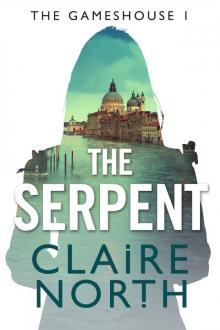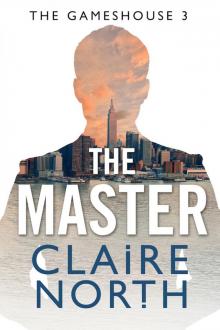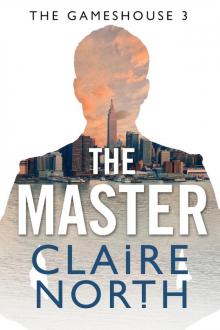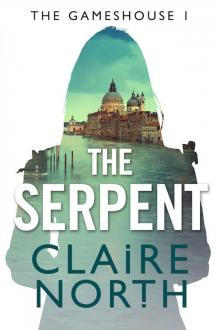- Home
- Claire North
The Gameshouse Page 4
The Gameshouse Read online
Page 4
—And in a month?
—The game will end, and so will your obligation to it.
—And my debts?
—All debts end with the game.
—I shall do as you ask.
He does not see her smile.
And who is this?
The Queen of Cups.
La Bella, beautiful lady Pisana, queen of the night. She is a poetess and a good one, though her words will be burned by a vengeful bishop-turned-lover who will call her heretic and whore. She has read the works of Julian of Norwich, and calls God “mother” and Jesus “sister”, and proclaims that the word of Christ is compassion and love, and that man who would deny it is no more holy than the droppings of a donkey. Is this heresy?—No, she will say, when they put her before the judge.—For the divine is neither man nor woman, and being so I choose the name that is most kind, most loving, most giving to the goodly of earth, and say that in heaven I shall find my sisterhood.
Now she sits, ankles showing, knees showing, one leg draped across another, skirt pulled high, and turns the card that is presented to her between her fingers and smiles.
—I used to be a player, she says.—I know your game. What sad times that I am now a piece.
—Sad indeed, Thene replies, barely wetting her lips with the fine wine that was offered.—How did you come to this pass?
—I wagered more than I had to give. I gambled the life of my child against fifteen years of a woman’s youth. But my child died before the game was completed, and there being no mercy in the house, I lost my place. I am not angry now—those are the rules, this is the game. The game is greater than I comprehended, and has been played longer and on boards far wider than this you play now. Had I known that, I might not have laid any wager at all. Yet here we are.
—Here we are.
—You want something from me, no doubt. I am a powerful card in your hand, yes? The Queen of Cups, no less! It is apt, I suppose, and good to see that the Gamesmaster has not lost her sense of humour.
—I hear your women sometimes are about the house of Orio Faliere.
—You hear correctly, but they never attend the old man himself. He has interest in neither women nor girls—not even pretty boys seem to arouse his icy flesh.
—Who then do your ladies sport with?
—His sons. His servants. His men-who-hang-about-hopefully. The vast majority of the great houses of Venice are peopled with this sort, and they all seek an outlet for their disappointments sooner or later.
—They are of some use to me, but not so much use as Faliere himself.
—You are playing a game for… what? The Supreme Tribunal—is that your prize? It is, isn’t it?! I had wondered if the Gameshouse would intervene. Which player do you play? Belligno? Tiapolo?
—I do not think I should say.
—Perhaps not, though the card you hold binds me to you for the duration of the game, and there is much discretion in my business. Let me ask you this then: how many players do you know of?
—Four.
—Four! And of those four, I can assure you, luck will have been uneven in her favours. Ask yourself, why has the Gamesmaster—or mistress I should say—singled out only four? The house has its purposes, and you must never forget that if you desire to win.
—Perhaps when I have won, I will enquire further.
—When you win, you will not enquire at all. The victory—the victory is all! Should you win, you may not wish to jeopardise your new status with reckless questioning. So it is that comfortable people settle into a deceiving life, finding truth somewhat unpleasant. But I like you, my lady. I am glad that you hold my card. If you wish to deploy me most advantageously, I would not suggest Faliere. He is too cold, too aloof, too dead-to-the-skin. Seluda now, he is fiery for every kind of flesh, though you would hardly think it to look at him; Belligno and Contarini both have wagging tongues, and other parts besides.
—They also have other weaknesses which I might explore. There is a rumour that Belligno had a son…
—Ah yes, the foolish boy who went to Milan!
—You know something of this?
—I know that he was reckless with his love and wrote ballads and odes for nearly every lady of Venice. The husbands of these ladies doubtless would have had something to say on the matter, but in this city Belligno protected his boy from their ire and so he became more love-struck and even more foolish.
—And vanished?
—Not in Venice: in Milan.
—Why did he go to Milan?
—His father was a little embarrassed, I believe, at the son’s activities.
—A little embarrassed?
—Even Bellignos feel shame when the boy is too drunk to tell the difference between pretty girls and pretty boys, and takes all equally.
—So sent the boy to Milan?
—This was two years ago, maybe more.
—He never returned.
—No. He never did.
—And what does the father make of all this?
—He believes his boy is dead.
—Do you believe that?
The Queen of Cups hesitates, lips curling into her mouth, tongue running along the inside, head turning a little to one side.
—Why do you play, my lady? she asks at last.
Thene hesitates.
—Come, come, chides the other.—We are sisters, and I am in your hand. I was a player; I may be of some greater use to you than you first perceived. Why do you play?
—To be free.
—Of what?
—My husband. My family. My blood. My name. All of it. To be… powerful. Nor do I say “power” for its own sake, but rather I would say for power-as-strength. Power as the strength to be known for myself, to live for myself, to be—in a manner that has until now been denied to me—myself. That is why I play.
At this, Pisana tuts.—That is a very bad thing for a player.
—How so? Surely a good player has cause greater than themselves to play?
—Not at all. A cause will corrupt your perception of the board, lead to decisions made in sentiment which should have been made in thought. There is only one reason, only one, why you should embark on this game. Would you like to know it?
—Yes. I would.
The Queen of Cups leans in closer, whispers, her lips brushing the ridges of Thene’s ear.—You play to win, she breathes.—That is all.
So saying, she sits back, smiles a pleasing smile, giggles like a girl and says,—We were discussing Belligno?
Thene takes a moment. Relaxes her hands. Looks a little to the left, a little to the right, then meets Pisana’s eye again. The moment that was might never have been.—Do you believe Belligno’s son to be dead?
—Yes. I do. They say he was unwise in his affections in that city. Those husbands, fathers, brothers who in this city might have permitted him to have his amorous adventures in fear of the father, in Milan felt no such concern. Belligno could not protect his boy once he had crossed the lagoon, but both father and son were, I think, too foolish to consider this.
—So the son died?
—Vanished, rather. Though what the difference is, save for one of suspended hope, who can say? Do you want me to make enquiries? I have some friends in Milan.
—No. Thank you. I think it perhaps best that I use other resources for that enquiry, and employ you on matters more conducive to your trade. Faliere—
Here the Queen of Cups huffs indignantly; Faliere, Faliere, what good is he to her, or she to him? Yet Thene will not be swayed.
—… keeps himself isolated from all things, is never seen beyond his own four walls, is guarded constantly, confides in no one. He is the piece that must be broken first, for he will be the hardest to break.
—I do not think female tenderness is your most likely tool to achieve this.
—A man may be approached by many means. Money, servants, spies, traitors—but Faliere is cold to them all. However, as you point out, his household is
not. He cannot win without calling upon the resources of all he now possesses, and he cannot defend every part of his kingdom at once. An unlikely assault from an unexpected source, targeting his pieces and not him, seems one of the few viable options available, and while I have enough money to bribe some in this regard, you are the Queen of Cups. You would not have been given this title were you not something greater than the usual sort.
—What do you know of the “usual sort”?
—More than the men, Thene replies.—Unlike men, I look at what is, rather than what I wish to perceive. Tell me—if Faliere is so cold to women, then what is the condition of his wife?
At this, Pisana smiles.
—There, she murmurs,—is an interesting question.
Chapter 13
A strategy.
Every player needs a strategy, but plan too precisely, commit too closely to only one path, and what danger there lurks! For you are not alone in this game—others will act against you as you act against them—and so softly, softly on.
Many words trouble her, the laughter of the Queen of Cups echoes in her mind.
I was a player once.
Play to win. That is all.
She shakes her head a little, pushing the memory of Pisana’s breath from her thoughts. A plan is forming now in Thene’s mind, but she is wary. First information, then the kill.
The Knave of Swords sits, one leg upon the table, his hands folded behind his head. Is it possible to swagger while sitting? If so, he succeeds.
His beard is black, darker than his brown hair. His nose and eyes are little hollows between the roaring mass of hair that shadows his face. He dresses in an extraordinary patchwork of fabrics, French and Bavarian, Flemish and Portuguese, his tailor a drunkard who loves to travel.
He says,—I fought a duel. My sword broke, and I lost. My sword never breaks. And here we are.
—I hold your card.
His arms open as if he would bow from where he sits.—My lady, he says, though he does not stand, does not remove his foot from her table, does not alter the fixed smile that waits without laughter behind his facial hair.
—Would you like me to kill someone? he asks.
—No.
—Why not? I am good at killing.
—Assassination is a crude move. Kill a piece too soon and the other players are made stronger in its absence. While there are four players there is balance, forces pulling every which way, resources stretched. My piece seems… perhaps weaker than I would like, but this could be an advantage. Let other players expend cards on battling each other, the strong tearing each other down, until they are weak enough that I may strike. An assassination now would destroy that balance, and though one day the balance must break, it is too soon for that.
—I’m better at fighting than I am sitting around composing Greek verse.
—Contarini has been behaving in an extraordinary manner. He does not sleep in the same places more than two nights in a row, sends decoys to hide his every move, writes letters in code and generally speaking behaves in a manner more suited to a criminal in the night than a candidate. I know that this is to protect against any interference from players such as myself, but I believe that in doing so, he has created a weakness. Being constantly on the move and with security so high, he must of necessity devolve some of the everyday running of his affairs to lower men of his household. It is this that I wish to explore. Speak to his stewards. Buy them drinks, share tales of adventure, walk drunkenly home with them through the night. Find out from them not where Contarini is, but where his wealth is. Like the rest of us, his position depends on finance—if we can empty his chests before the election, he will be no threat.
—Drink and politics?
—I would have thought some of that would appeal.
—You hold my card, he replied with a shrug.—Not my decision how you play it.
And as she walks through the streets in the night
… a sense.
A suspicion.
A question?
Is she being followed?
The thought, made sharp by circumstance, runs with her all the way to the Grand Canal.
The rules have promised her safety, but what does that mean now? Nothing, perhaps. Everything. Something. A question she cannot answer, a fear she cannot know, she picks up her pace, not running, not that, but moving in search of light, people, alleys too tight, buildings too high, a church ahead—to this she flees, slamming the door behind her, candles, the smell of incense, her heart too fast, too fast in her ears, in her eyes, in the pulsing of her throat. A church is not safety, though it may be stillness for a while. She stops. She slows her breath. Slows her fingers, her eyes, her thoughts.
She is a player.
She is a player.
She is the player.
Victory will be hers.
She turns to the doors and steps out into the dark.
Examines the shadows—see her there, so proud, so straight! Thene, Thene, there is no fear now: there is only the player. She watches and defies the dark to do her harm; it is her dark, her night, her city; to her will it shall bend, if it bends to anything at all.
We watch her depart.
We watch.
Chapter 14
Alvise Muna, the Seven of Staves.
—Tiapolo bribes everyone, he whispers.—He has promised his daughters in marriage to nine people already—nine! They say he has pledged over ten thousand ducats to the election so far, with a promise of land, glory, wealth—anything—to anyone who supports his cause.
—And does he succeed?
—A great many men have accepted his gifts, but no one says his name out loud.
—And why do you think that is?
—He makes promises he cannot possibly keep. His spending is unsustainable; it is… crude.
Muna’s lips curl in disdain at the word. He says,—His people threaten those who do not speak in his support. It is not how we play the game. A man who receives the precise sum of gold that will discharge his debt to a clawing physician is more grateful and more personally bound than he who receives some greater, larger sum paid without consideration.
—But if the election were today?
—Tiapolo would win because no one else has yet made their move, and because the Council of Forty knows the value of a weak leader too, one who might be easily lead.
—And if it is tomorrow?
—That depends on what you do next. A loyalty that is purchased for coin lasts only as long as the next offer.
—You say he has people.
—A man in court that I know for certain.
—Do you know who?
—Someone powerful, high. Yesterday Belligno’s man was denied access to the Council of Seven. That has never happened before.
—Someone on the Council itself?
—I imagine so.
—I need to know who.
—How do you suggest I find out? Ask in the palace, “Is anyone else sworn to serve a stranger with a card, a house with no name?” I don’t think so.
—Extraordinary behaviours stand out, breaks in pattern. I must know what cards the others are playing if I am to counter them. But if you think so little of Tiapolo’s efforts to win support, who would you consider next in the running?
—Yesterday it would have been Belligno, but he lost votes this morning when word came of a ship of his floundering at sea. We do not like people who lose vessels.
—So today?
—After Tiapolo… Contarini is the most spoken of, and with the greatest respect. The bishops have declared for him, and their coffers carry as great a sway as any word of the Lord.
—Contarini, not Faliere?
—Faliere is still unknown, as is Seluda. Both seem to be waiting to make a move.
—Faliere trades with Constantinople, does he not?
—Indeed. He was one of the very first to speak to the infidel when peace was declared. At the time he was derided for this, called
a traitor and a heathen. But those unwise councillors who mocked him then come begging to his door now for passage to Egypt or a bar of Syrian soap.
—It does not affect his standing?
—Honour is easily bought, and Faliere is very rich.
—The bishops, you say, are for Contarini?
—Yes.
—Thank you.
—Are you winning? he asks as she turns away.
—Not yet, she answers.—Not yet.
Contarini, Contarini, how infuriatingly hard it is to find information on Contarini! What is his game? What does he do with the bishops, this stone merchant, this man of stone? She looks and she cannot yet see it, though at least now she has some idea of the direction in which it turns. She pens a note to the Knave of Swords saying,—The bishops. See what it is Contarini does for the bishops.
Then there is Faliere: his fingers touch only paper and steel, nothing warmer, and it seems that his soul is made of the same stern stuff. The Queen of Cups is about her work but then again, there is nothing in the rules of the game that says Thene herself may not make some enquiries. Not at the top—no, the heads of the Faliere house are too afraid of their master, too tightly knit to him, to ever betray his trust.
To the bottom then, to those quiet people with flapping ears who everyone ignores, the necessary souls who are no more and no less than a piece of floating furniture.
A gondolier, his legs upon the prow of his boat, his hands behind his resting grey head, who laments—how he laments!—that his day is spent waiting for Orio Faliere to summon him to his trade, how days sometimes go by and no, he does not set forth, he does not do his duty but rather waits and waits and waits, forbidden from leaving this place on the chance that someone in the house needs his services, but he could be elsewhere, he could be fishing…
—But are you not paid to wait? she asks.
—Yes, I’m paid to waste my youth in this place, waiting on whims, but I could be paid and fishing, instead of paid and waiting!

 Gamehouse 01 - The Serpent
Gamehouse 01 - The Serpent The Master
The Master Gamehouse 03 - The Master
Gamehouse 03 - The Master The Thief
The Thief The First Fifteen Lives of Harry August
The First Fifteen Lives of Harry August The Serpent
The Serpent The Sudden Appearance of Hope
The Sudden Appearance of Hope The Pursuit of William Abbey
The Pursuit of William Abbey 84k
84k The Gameshouse
The Gameshouse Touch
Touch Sweet Harmony
Sweet Harmony The End of the Day
The End of the Day Notes from the Burning Age
Notes from the Burning Age